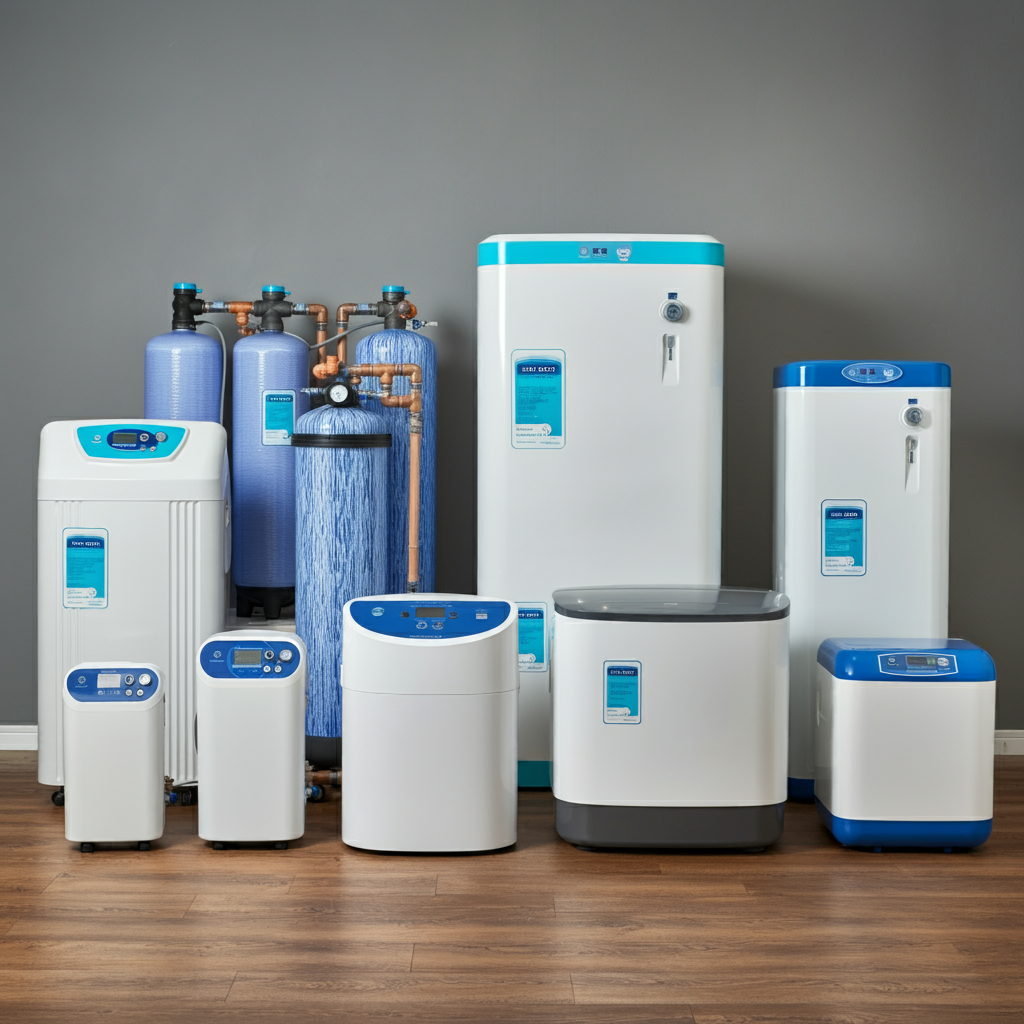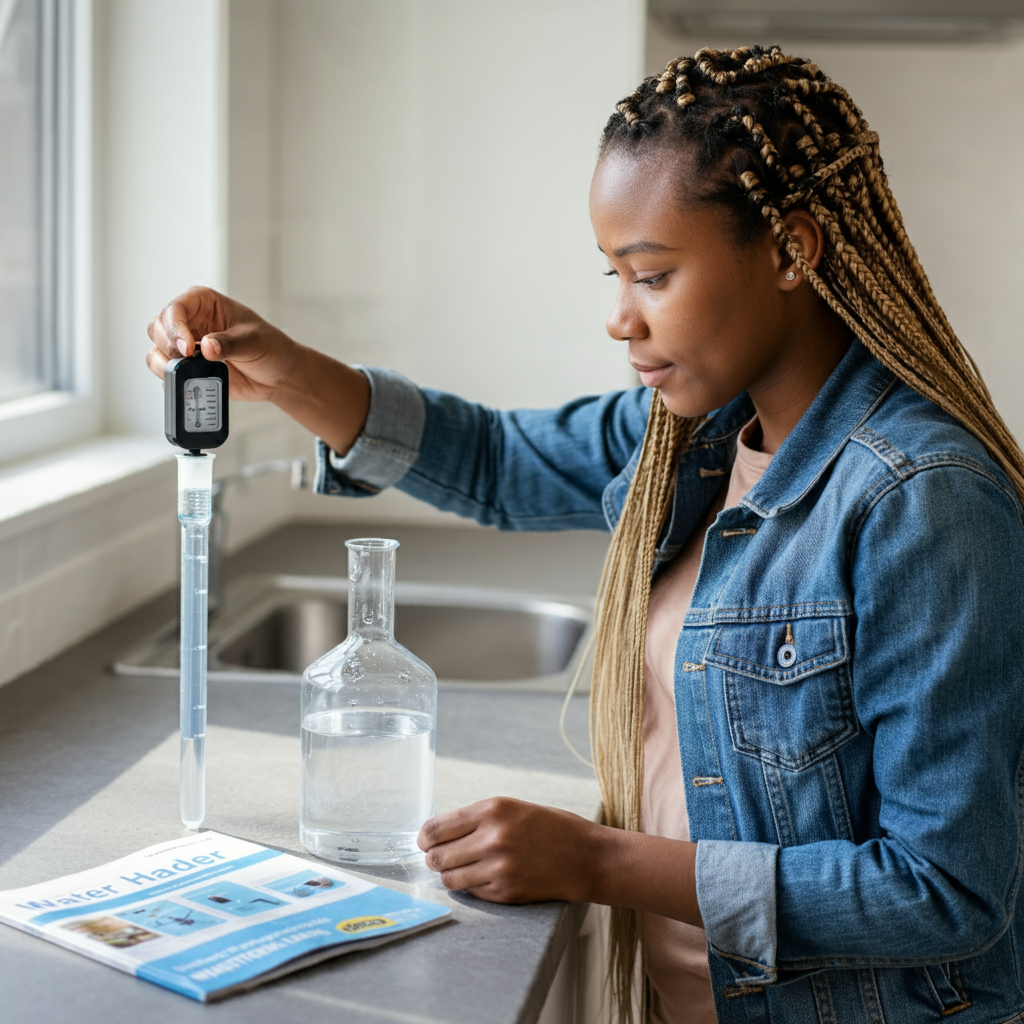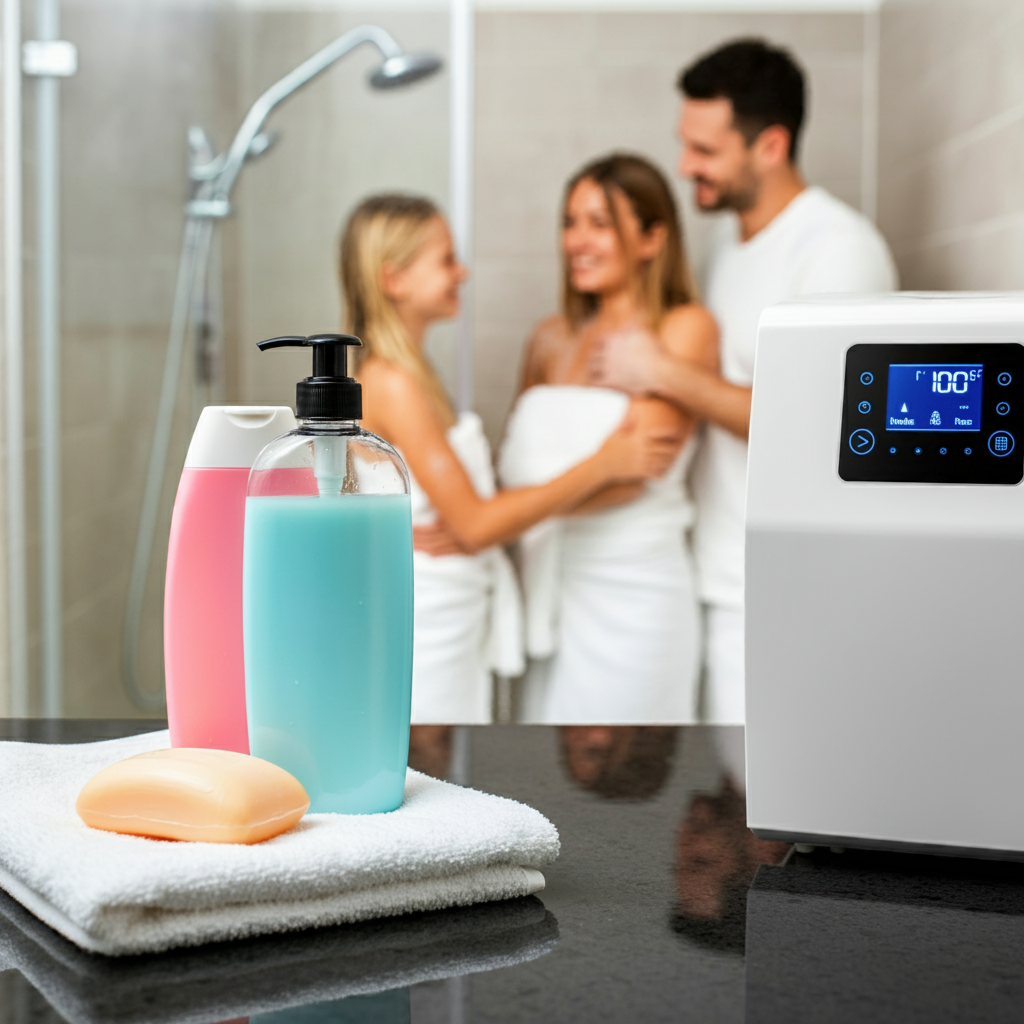Does the size of your household determine the size of your water softener? Absolutely! The number of people living in your home directly impacts the amount of water you use, and this, in turn, dictates the capacity your water softener needs to effectively combat the pesky problems caused by hard water. At WaterSoftenerSizing.com, we understand that every family is different. That’s why we’re dedicated to helping you find the perfect water softener size that caters to your unique needs and ensures you enjoy the full benefits of soft, clean water. Hard water, water with high mineral content like calcium and magnesium, can wreak havoc on your home. It leaves behind unsightly soap scum, dries out skin and hair, and can even shorten the lifespan of your appliances and plumbing fixtures. A water softener, a device that removes these minerals through a process called ion exchange, is the solution to these woes. But choosing the right size is crucial. Think of your water softener like a sponge. It can only absorb a certain amount of “hardness” before it needs to be “wrung out” or regenerated. If your softener is too small for your household’s water usage, it will regenerate more frequently, consuming more salt and energy. On the other hand, an oversized softener is an unnecessary expense and may not operate efficiently. That’s where WaterSoftenerSizing.com comes in. We’ll guide you through the factors that influence water softener sizing, starting with the most crucial one: the number of people in your home. We’ll also delve into other important considerations like water hardness levels and appliance usage, ensuring you have all the information you need to make an informed decision.
Hard Water: Why Does it Matter?
Hard water, simply put, is water that contains a high concentration of dissolved minerals, primarily calcium and magnesium. While these minerals aren’t harmful to ingest, their presence can cause a myriad of problems throughout your home. Soap doesn’t lather as easily in hard water, leaving behind a sticky residue known as soap scum on your skin, hair, and bathroom fixtures. This film not only looks unpleasant but can also clog pores and contribute to dry skin and hair. Over time, hard water can even damage your appliances and plumbing. The mineral deposits can build up inside pipes, reducing water flow and efficiency. In water heaters, these deposits form a layer of scale that forces the appliance to work harder, consuming more energy and potentially shortening its lifespan. The Water Quality Association (WQA), a leading organization in the water treatment industry, reports that over 85% of American homes have hard water. This widespread issue affects homeowners across the country, from the Midwest, known for its particularly hard water, to areas relying on well water, which often has higher mineral content. Water softeners, offered by manufacturers like SoftPro, Kinetico, and Culligan, provide an effective solution to these hard water challenges. By removing calcium and magnesium through a process called ion exchange, water softeners transform harsh water into soft, luxurious water that’s better for your home, appliances, and family. Unlike water filters, which primarily remove sediment and contaminants, water softeners specifically target the minerals responsible for hardness. This focused approach ensures that your water is not only clean but also gentle on your skin, hair, and household fixtures. The result is a noticeable improvement in water quality, with benefits ranging from softer laundry and shinier dishes to reduced soap scum and longer-lasting appliances.
How Many Gallons Does Your Family Use?
The size of your household—the number of people living under your roof—is the single most significant factor influencing your daily water consumption. And since a water softener’s capacity is directly tied to how much water it needs to treat, understanding your household’s water usage is crucial in determining the appropriate size for your softener. 
Average Water Consumption per Person
On average, an individual in the United States uses about 80-100 gallons of water per day. This includes water for drinking, cooking, bathing, washing clothes, and flushing toilets. However, this is just an average, and actual usage can vary significantly depending on individual habits, climate, and regional water rates. For instance, a family living in a hot climate like Arizona might use more water for showers and lawn irrigation than a family in a cooler region like Maine. Similarly, someone who takes long showers or frequently waters their garden will naturally use more water than someone who conserves water.
Household Size and Total Usage
To estimate your household’s total daily water usage, multiply the average water consumption per person by the number of people in your home. For example, a family of four would use an estimated 320-400 gallons of water per day (80-100 gallons/person x 4 people). It’s important to note that this is just a starting point. You’ll need to consider other factors that can influence your water usage, such as:
- Guests: If you frequently have guests, factor in their water usage as well.
- Pets: Pets also contribute to water usage, especially if you have a large dog that enjoys baths.
- Appliances: High-efficiency appliances like low-flow toilets and showerheads can help reduce water usage, while older models may consume more.
Peak Usage Times
Water usage isn’t evenly distributed throughout the day. Most households experience peak usage times, usually in the morning and evening, when people are getting ready for the day or winding down for the night. This means your water softener will need to handle a higher demand during these peak times. Understanding your household’s water usage patterns is essential for choosing a water softener with the right capacity and flow rate to meet your needs, even during peak hours. By accurately assessing your water usage, you can ensure that your softener is always ready to deliver soft, clean water when you need it most.
Understanding Water Softener Capacity: It’s All About the Grains
When it comes to water softeners, size isn’t measured in inches or feet, but rather in grains. This seemingly peculiar unit is the industry standard for measuring a water softener’s capacity, specifically its ability to remove hardness minerals from your water supply before it needs to regenerate.
What are Grains?
In the context of water softening, a grain is a unit of weight equivalent to 64.8 milligrams. It represents the amount of calcium carbonate (the primary mineral causing hardness) that a softener can remove. A water softener’s capacity, typically measured in thousands of grains, indicates how much hardness it can handle before it needs to be refreshed through a regeneration cycle.
Common Softener Sizes
Water softener sizes typically range from 24,000 grains to 80,000 grains or more. A 32,000-grain water softener, for example, can remove 32,000 grains of hardness minerals before it needs to regenerate. The appropriate size for your home depends on several factors, including household size, water hardness, and daily water usage.
Calculating Your Needs
Determining the right softener size involves a simple calculation that combines your household’s daily water usage and your water’s hardness level.
- Daily Water Usage: As discussed in the previous section, you can estimate your household’s daily water usage by multiplying the average water consumption per person by the number of people in your home.
- Water Hardness: Your water hardness level, measured in grains per gallon (GPG), indicates the concentration of hardness minerals in your water. You can obtain this information through a simple water test, which can be performed by a plumber or with an at-home kit.
- Calculation: To determine your daily softening requirement (in grains), multiply your daily water usage (in gallons) by your water hardness (in GPG). For example, a family of four using 300 gallons of water per day with 10 GPG hardness would need a softener capable of removing 3,000 grains daily (300 gallons x 10 GPG = 3,000 grains).
To simplify this process, WaterSoftenerSizing.com offers a user-friendly water softener size calculator that considers your household size, water hardness, and other relevant factors. This tool provides a personalized recommendation for the ideal softener size to meet your specific needs.
Water Softener Sizing Recommendations: A Guide for Every Family
Now that we understand how household size and water hardness affect your water softener needs, let’s explore specific recommendations for different family sizes. Remember, these are general guidelines, and your ideal softener size may vary depending on your unique water usage and hardness levels. For a more precise estimate, use our free water softener size calculator or consult with a water treatment professional.
1-2 People
For smaller households of 1-2 people, a water softener with a capacity of 24,000 to 32,000 grains is often sufficient. However, the exact size will depend on your water hardness:
- Soft Water (0-3 GPG): A 24,000-grain softener is usually adequate.
- Moderately Hard Water (3-7 GPG): A 32,000-grain softener may be necessary.
- Hard Water (7+ GPG): A 48,000-grain softener might be required.
3-4 People
Households with 3-4 people typically require a water softener with a capacity of 32,000 to 48,000 grains:
- Soft Water (0-3 GPG): A 32,000-grain softener can usually handle the demand.
- Moderately Hard Water (3-7 GPG): A 48,000-grain softener is a good option.
- Hard Water (7+ GPG): A larger softener, such as a 64,000-grain model, might be necessary.
5+ People
Larger households with 5 or more people will likely need a water softener with a capacity of 48,000 grains or higher:
- Soft Water (0-3 GPG): A 48,000-grain softener can be sufficient.
- Moderately Hard Water (3-7 GPG): Consider a 64,000-grain or larger softener.
- Hard Water (7+ GPG): A larger softener, such as an 80,000-grain model, may be required, and more frequent regeneration cycles might be necessary.
Customizable Solutions
Remember, these are just general recommendations. Your individual needs may vary depending on your specific water usage habits and the hardness of your water. To determine the most suitable size for your home, we recommend using our water softener size calculator or consulting with a plumber or water treatment professional. They can assess your specific needs and provide tailored recommendations to ensure you invest in a water softener that perfectly matches your household’s requirements.
More Than Just Family Size: Additional Considerations
While household size is a primary factor in water softener sizing, it’s not the sole determinant. Several other factors can influence your water softener needs and should be considered when selecting the right size for your home.
Your Water Hardness Level:
Water hardness plays a significant role in determining the appropriate softener size. The harder your water, the more minerals it contains, and the more frequently your softener will need to regenerate. Therefore, households with very hard water will typically require larger softeners than those with softer water, even if the household sizes are similar. For example, a family of four with moderately hard water (5 GPG) might be well-served by a 48,000-grain softener. However, if that same family has very hard water (15 GPG), they might need a larger 64,000-grain softener to effectively remove the increased mineral content.
High-Efficiency Appliances:
High-efficiency appliances, such as low-flow toilets, showerheads, and washing machines, can significantly reduce your household’s overall water usage. While this is excellent for conservation, it can also influence the size of the water softener you need. If your home is equipped with numerous high-efficiency appliances, you might be able to opt for a smaller softener than initially estimated based solely on household size. It’s essential to consider the water-saving benefits of these appliances when calculating your daily water usage and determining your softener size.
Future Family Plans:
If you’re planning to expand your family in the near future or anticipate having more frequent guests, it’s wise to factor in this potential increase in water usage when choosing a water softener. For instance, if you currently have a family of three but are expecting another child soon, you might want to select a softener that can accommodate the water usage of a family of four. This will ensure that your softener can adequately handle the increased demand as your household grows. By taking these additional factors into account, you can refine your water softener sizing calculation and select a model that not only meets your current needs but also adapts to your household’s evolving water usage patterns. Remember, choosing the right size water softener is an investment in your home’s comfort, efficiency, and long-term value. At WaterSoftenerSizing.com, we encourage you to utilize our comprehensive resources and tools to make an informed decision. Our free water softener size calculator and expert consultations can help you navigate these factors and find the perfect softener size for your unique situation.
Need Expert Advice? We’re Here to Help!
Determining the perfect water softener size for your home can feel overwhelming with so many factors to consider. But don’t worry, you don’t have to navigate this process alone. At WaterSoftenerSizing.com, we’re committed to making your journey towards softer water as smooth as possible. 
Plumber Consultation
One of the most crucial steps in the water softener sizing process is accurately measuring your water hardness. A licensed plumber can perform a professional water test, providing you with precise data on the mineral content of your water. This information is essential for calculating the correct softener size. Plumbers, also known as plumbing professionals, are skilled tradespeople who specialize in installing, maintaining, and repairing plumbing systems. Their expertise extends to water treatment solutions, including water softeners. A consultation with a plumber can provide valuable insights into your home’s specific water conditions and help you choose a softener that’s right for you.
WaterSoftenerSizing.com’s Expertise
Our team of experienced water treatment professionals is well-versed in the intricacies of water softener sizing. We understand that every home is unique, and we take a personalized approach to each consultation. When you reach out to us, we’ll ask you a series of questions about your household size, water usage habits, and any specific concerns you have about your water. Based on this information, we’ll utilize our in-depth knowledge and industry-leading tools to calculate the ideal water softener size for your home.
Our Partner Network
We’ve established partnerships with reputable water softener manufacturers and installers across the country. This means that we can connect you with trusted professionals who offer high-quality products and reliable installation services. Our commitment to collaboration ensures that you have access to the best solutions available in the market. Whether you’re a homeowner seeking softer water for your family or a business owner looking to protect your equipment and improve efficiency, WaterSoftenerSizing.com is your trusted partner in water softening success. We’re dedicated to providing you with the knowledge, tools, and resources you need to transform your water quality and enhance your daily life.
Making the Right Choice: Your Path to Softer Water
Choosing the right water softener size is a crucial decision for any household or business grappling with hard water issues. As we’ve explored, the size of your family significantly influences the capacity your softener needs to effectively remove hardness minerals and deliver the soft, clean water you desire. The amount of water your household uses daily, combined with the hardness level of your water, determines the ideal size for your softener. For smaller households, a softener with a capacity of 24,000 to 32,000 grains may suffice, while larger families might require 48,000 grains or more. However, it’s important to remember that these are just general guidelines. Factors like water hardness, the presence of high-efficiency appliances, and future household growth can all influence your specific needs. At WaterSoftenerSizing.com, we’re here to simplify this process and guide you towards the perfect water softener solution. Our free water softener size calculator and expert consultations take the guesswork out of sizing, ensuring you invest in a system that’s perfectly tailored to your home.
Key Takeaways
- Household Size Matters: The number of people in your home directly impacts your water usage and, consequently, the size of the water softener you need.
- Water Hardness Plays a Role: Harder water requires a larger softener to effectively remove minerals and prevent frequent regeneration cycles.
- Consider All Factors: High-efficiency appliances and future household growth can influence your softener size needs.
- Consult the Experts: A professional water test and consultation with a plumber or water treatment specialist can provide accurate data and personalized recommendations.
Are you ready to transform your water and experience the benefits of soft, clean water throughout your home? Take the first step by using our water softener size calculator or contacting our team of experts. We’re committed to helping you find the ideal water softener size for your family’s needs and budget.

Craig “The Water Guy” Phillips is the founder of Quality Water Treatment (QWT) and creator of SoftPro Water Systems.
With over 30 years of experience, Craig has transformed the water treatment industry through his commitment to honest solutions, innovative technology, and customer education.
Known for rejecting high-pressure sales tactics in favor of a consultative approach, Craig leads a family-owned business that serves thousands of households nationwide.
Craig continues to drive innovation in water treatment while maintaining his mission of “transforming water for the betterment of humanity” through transparent pricing, comprehensive customer support, and genuine expertise.
When not developing new water treatment solutions, Craig creates educational content to help homeowners make informed decisions about their water quality.



It is appropriate time to make a few plans for the long run and it is time to be happy. I’ve learn this publish and if I may just I wish to suggest you some attention-grabbing issues or tips. Perhaps you can write subsequent articles regarding this article. I want to read more issues approximately it!